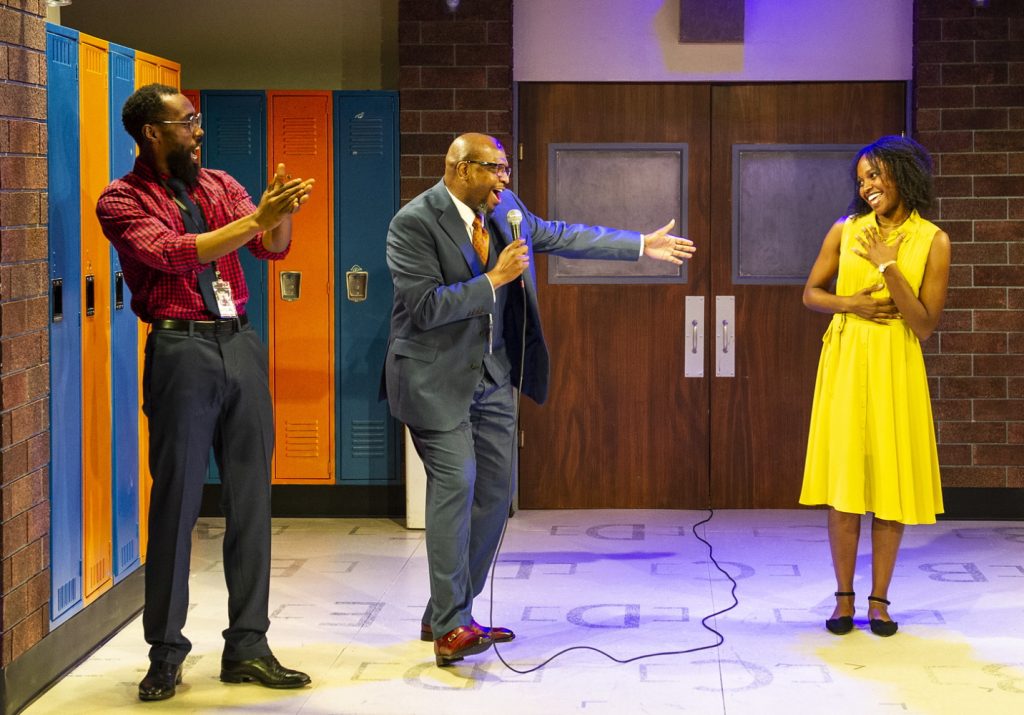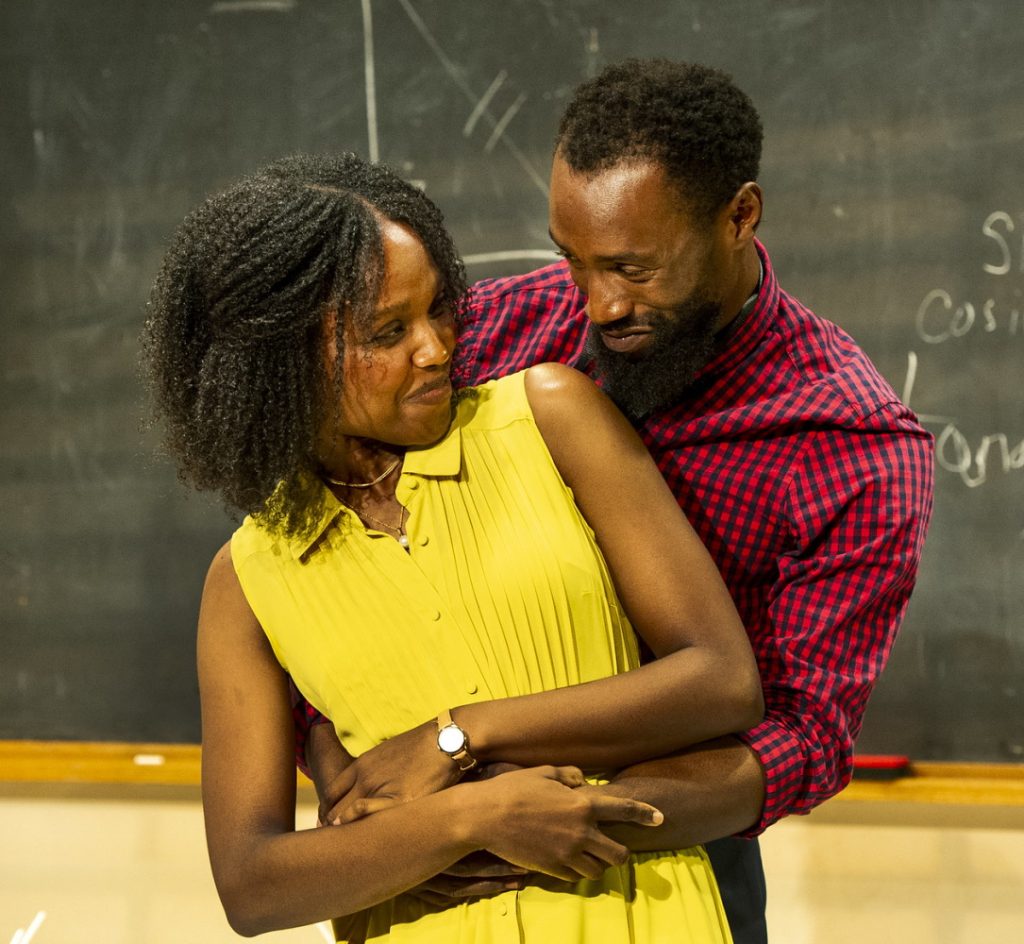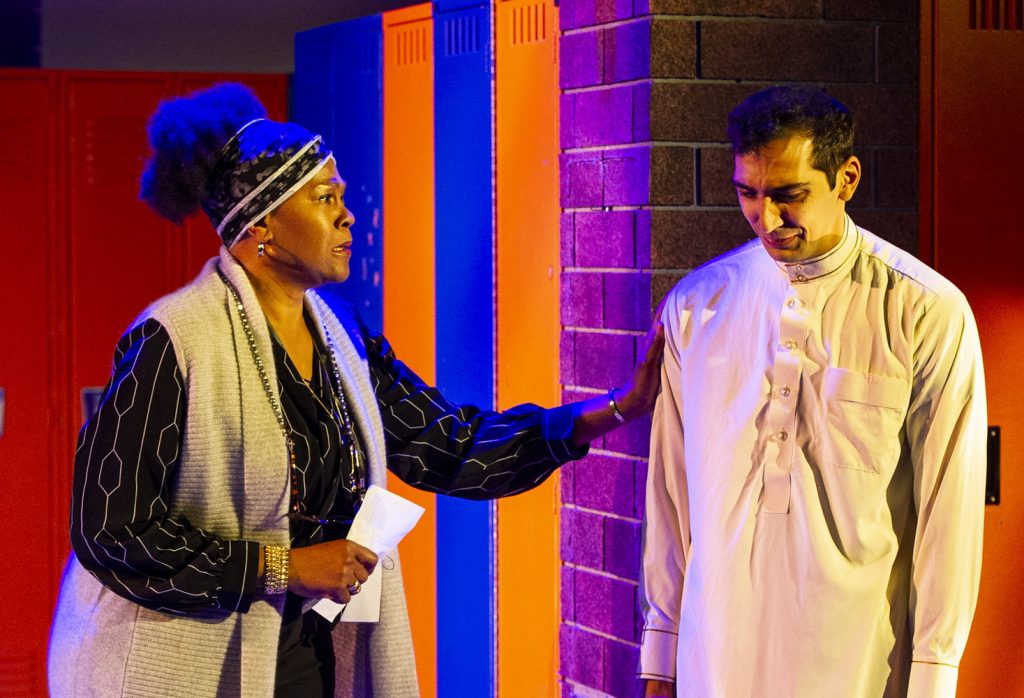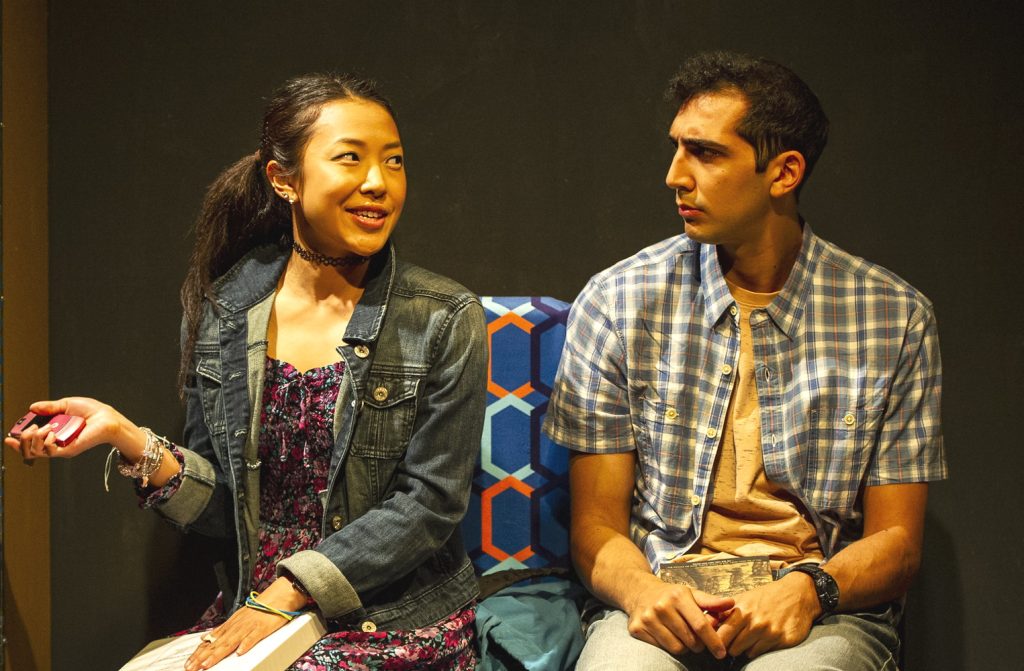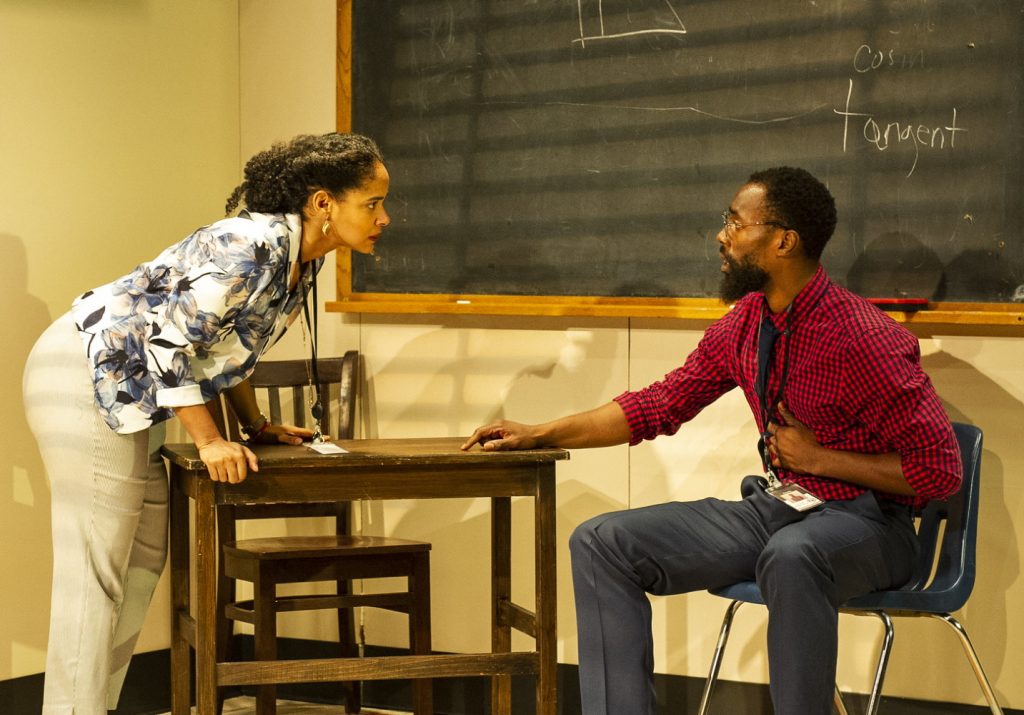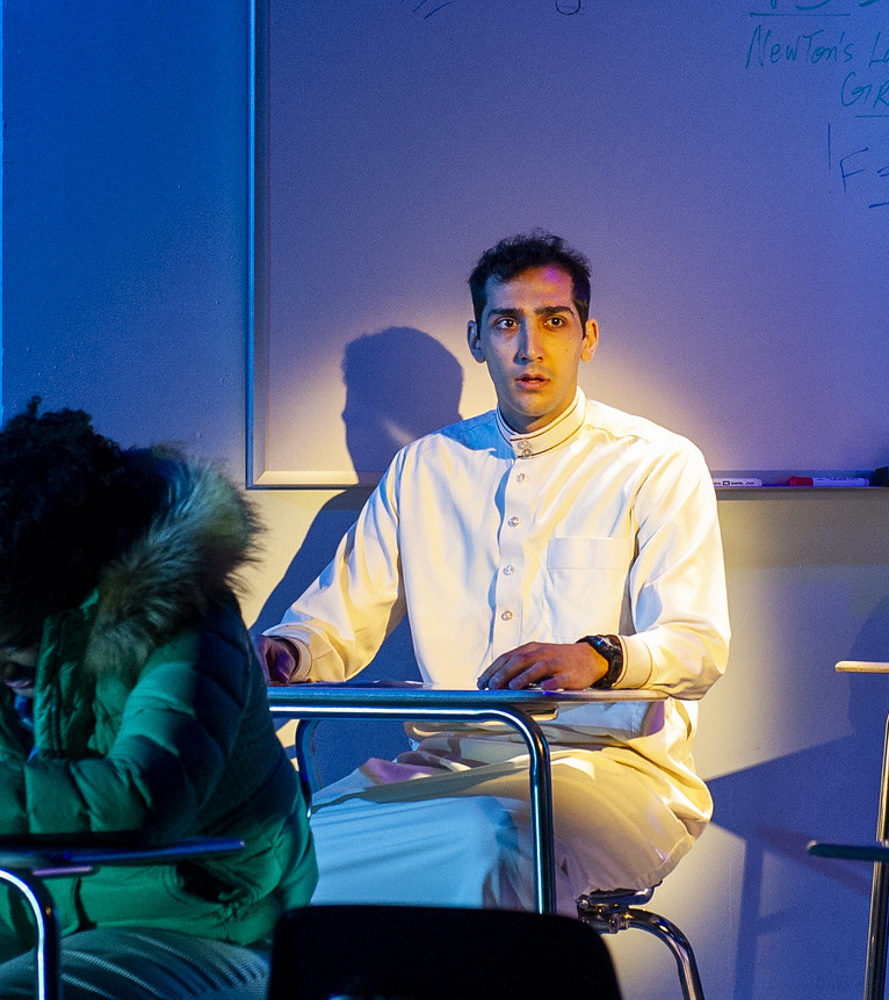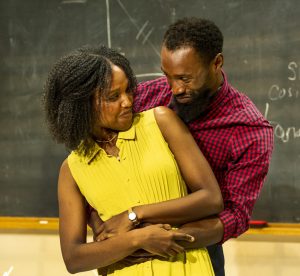The set in Barrington Stage Company’s ABCD is bisected by a hallway lined with lockers. It both connects and separates two city schools that are miles, and worlds, apart.
May Treuhaft-Ali’s world-premiere play (her first professional production, in fact) is based on actual events in the No Child Left Behind era of the early 2000s, when teachers and students at two U.S. schools were caught in wholesale cheating on mandated exams. Though her script is molded by these incidents, she’s motivated by the knowledge that they were not outlier instances.
 Carnegie Middle School serves a low-income, largely Black and Latino/a population. It’s starved of basic resources, like an art teacher, a computer lab and a full-time school nurse. “The lowest-performing school in the district,” according to its stressed-out principal, is at risk of being shut down if the standardized test scores don’t dramatically improve.
Carnegie Middle School serves a low-income, largely Black and Latino/a population. It’s starved of basic resources, like an art teacher, a computer lab and a full-time school nurse. “The lowest-performing school in the district,” according to its stressed-out principal, is at risk of being shut down if the standardized test scores don’t dramatically improve.
At the other side of the city, Columbus Preparatory, an elite, highly competitive public high school (the model is Stuyvesant High in New York) with an almost exclusively white and Asian-American student body, has all the necessaries and most of the frills, too, including a swimming pool – and one Black teacher.
At Carnegie, all the staff we meet are people of color.
Davon Lawrence is the basketball coach as well as a math teacher. Mika Ramos (history) was Davon’s “first teacher,” tutoring him when they were both students at this school. Tamara Gardner (English), Davon’s fiancée, is young, passionate and already overwhelmed by the school’s dysfunction. “All the culturally responsive lessons and restorative justice techniques, everything I learned in grad school, I just can’t do that here. Not when I have to be a teacher and a social worker and special ed and ESL and a janitor, all at the same time.”
Principal Ellis, fearful the school will close, has a plan for turning things around. He enlists Davon and Mika in a scheme to keep the place afloat by secretly altering the test scores.
 At Columbus Prep, Joanna Krueger (physics) is the school’s only Black teacher. We also meet two juniors in her class. Bilal is a sweet, nerdy, hardworking kid with Iraqi-immigrant parents. The only Asian student who is Middle Eastern – and Muslim – he’s either ignored by the other kids or mocked because he wears a long white thawb for Friday prayers, getting him tagged as “the guy in the dress.”
At Columbus Prep, Joanna Krueger (physics) is the school’s only Black teacher. We also meet two juniors in her class. Bilal is a sweet, nerdy, hardworking kid with Iraqi-immigrant parents. The only Asian student who is Middle Eastern – and Muslim – he’s either ignored by the other kids or mocked because he wears a long white thawb for Friday prayers, getting him tagged as “the guy in the dress.”
Sunghee is Korean-American, popular and blithely cynical, attending Korean-language lessons after school because “my parents think it’ll look good on college apps, and so I don’t look like a total Twinkie – yellow on the outside, white on the inside.”
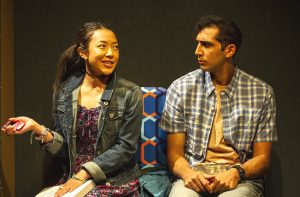 Here, it’s the students who feel the pressure to succeed. “Everybody here wants to go to Harvard,” Bilal says, and because of that, Sunghee assures him, everyone cheats. Except, apparently, Bilal. “Omigod how have you even survived this school?” she exclaims. “Do you have bad grades or do you just not sleep?”
Here, it’s the students who feel the pressure to succeed. “Everybody here wants to go to Harvard,” Bilal says, and because of that, Sunghee assures him, everyone cheats. Except, apparently, Bilal. “Omigod how have you even survived this school?” she exclaims. “Do you have bad grades or do you just not sleep?”
Reluctantly, if only to be noticed and accepted by his peers, Bilal agrees to secretly text the answers on the all-important physics exam to all his classmates (it’s multiple-choice, A-B-C-D).
 Davon and Mika, at Carnegie, are both experienced, dedicated teachers, plenty frustrated by the system but unjaded. We feel all that in Brandon St. Clair’s and Maribel Martinez’ affecting portrayals, he laid-back (until the lawbreaking tenses him and disturbs his heart, both physically and symbolically), she brisk and composed (until things fall apart). Though we don’t see any of their students, we sense the connection, the devotion that makes the pair good teachers, through their performances.
Davon and Mika, at Carnegie, are both experienced, dedicated teachers, plenty frustrated by the system but unjaded. We feel all that in Brandon St. Clair’s and Maribel Martinez’ affecting portrayals, he laid-back (until the lawbreaking tenses him and disturbs his heart, both physically and symbolically), she brisk and composed (until things fall apart). Though we don’t see any of their students, we sense the connection, the devotion that makes the pair good teachers, through their performances.
Torée Alexandre’s Tamara, the relative newbie teacher, moves with a wide-eyed, wiry energy undiminished, as yet, by disappointment. Principal Ellis’s disappointments, in Melvin Abston’s nuanced performance, have built a cynical shell and an ends-and-means disposition that allows him, in the name of survival, to deceive not only the school system but his own teachers.
At Columbus, Chavez Ravine’s Ms. Krueger shows us a teacher strict but compassionate, principled but just as tired as her opposite numbers across town.  And Juri Henley-Cohn lends a weary humanity to Bilal’s father, a doctor who fled Iraq and now runs a falafel shop, trying to make it in a strange land while keeping hold of the traditional values and practices, laying down a prayer mat to urge his stressed-out son to devotions.
And Juri Henley-Cohn lends a weary humanity to Bilal’s father, a doctor who fled Iraq and now runs a falafel shop, trying to make it in a strange land while keeping hold of the traditional values and practices, laying down a prayer mat to urge his stressed-out son to devotions.
As Bilal, Justin Ahdoot has a hesitant, often melancholy demeanor, a little hunched from anxiety, with the eyes of a trapped rabbit. In contrast, Pearl Shin’s Sunghee, if she lived in California, would be a Valley Girl – the motor-mouth, the hair flip, the blasé façade – for whom the in-crowd is the center of the universe.
Their scenes together are the most convincing – and the most fun – perhaps because the playwright is nearer in age to them (she’s 26), and partly because the adult dialogue is more plot-oriented, moving the play’s 90 minutes propulsively but sometimes awkwardly toward its climax and crash.
The cast is across-the-board excellent (also the summer’s most good-looking). They are well served by Daniel J. Bryant’s savvy direction, which creates a sense of momentum without losing the human connections. In Baron E. Pugh’s clever set, the locker-lined walls spin away to reveal interior classroom and home settings – the reality behind the brick-and-steel surfaces.
An insert in the program includes details of the true-life events the play is based on, ending with this revealing question:
If the pressure to perform sets people up for failure at both the underserved and most elite schools in our country, then whom does our education system serve?
Emerging from the Covid crisis and the recent racial reckonings, theaters are reaching out to present topical themes, and especially works by and about people of color. In fact, Barrington Stage has led the region’s theaters in that regard for quite a while. ABCD, playing through July 23, is a valuable addition to that record.
Playing through July 23 on the St. Germain Stage at Barrington Stage Company, Pittsfield.
Info and tickets here.
Photos by Daniel Rader
In the Valley Advocate’s present bi-monthly publication schedule, Stagestruck will continue to be a regular feature, with additional posts online. Write me at Stagestruck@crocker.com if you’d like to receive notices when new pieces appear.
Note: The weekly Pioneer Valley Theatre News has comprehensive listings of what’s on and coming up in the Valley and beyond. You can check it out and subscribe (free) here: http://www.pioneervalleytheatre.com/
The Stagestruck archive is at valleyadvocate.com/author/chris-rohmann
If you’d like to be notified of future posts, email Stagestruck@crocker.com

